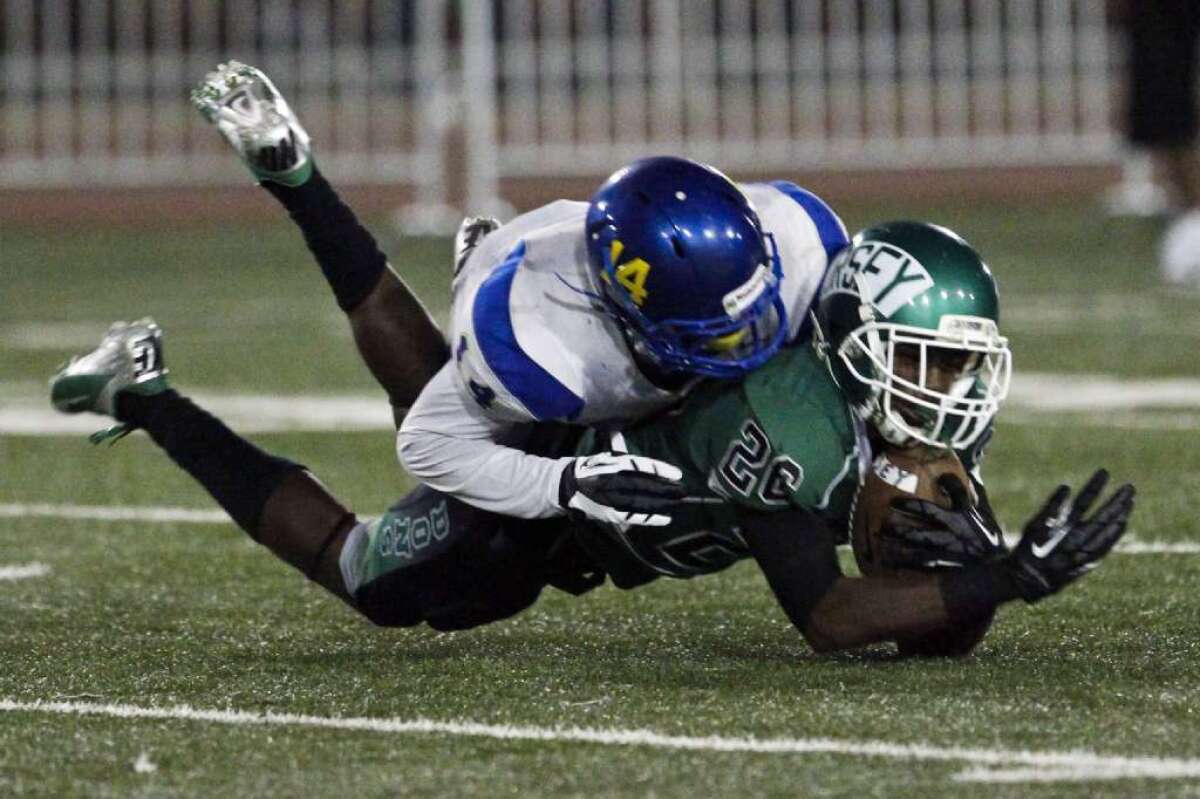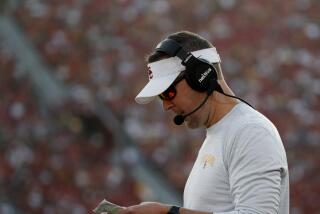Study: No helmet brand can save football players from concussion risk

Health experts have some bad news for high school football players: There is no particular type or brand of helmet or mouth guard that will keep you relatively safe from a concussion.
The companies that make helmets and mouth guards often claim that their own products can reduce players’ risk of a sports-related concussion or lessen the impact of a concussion that does occur. These manufacturers cite “laboratory research” that purports to show one brand is safer than others, and a group of researchers wanted to see if they could verify such claims, according to a summary of a presentation they made Monday at a national meeting of the American Academy of Pediatrics.
The research team, from the University of Wisconsin-Madison and the Medical College of Wisconsin, tracked 1,332 high school football players from 36 schools during the 2012 season. Participating players completed a preseason questionnaire about their injury history and demographic information. Then, as the season progressed, athletic trainers from the schools kept tabs on the incidence and severity of any concussions that occurred.
At the start of the study, 171 of the players — or 13% — told the researchers that they had experienced a sports-related concussion in the previous 12 months. During the 2012 football season, an additional 116 concussions were sustained by 115 players — 8.6% of the student athletes in the study.
Post-concussion return to learning also a tough decision
When the researchers compared the rates of concussions for each type of helmet, they found essentially no difference by brand or by year made. The rate of concussions for players wearing Riddell helmets (the most popular brand in the study) was 9.5%; while the rate for players wearing Schutt helmets was 8.1% and the rate for players wearing Xenith helmets was 6.7%. There was no statistically significant difference in those figures, the team reported.
Nor was there any difference in the severity of concussions, as measured by the number of days players had to sit out (13.5, on average, for those wearing Riddell and Xenith helmets and 13 for players wearing Schutt helmets).
In addition, the concussion rate for helmets made in 2011 or 2012 was 9.3%, which was statistically indistinguishable from the 7.9% rate for helmets made in 2009 and 2010 or the 8.8% rate for helmets that were even older than that.
There was a surprising safety difference when it came to mouth guards. The data showed that the 39% of players who wore “specialized mouth guards” that were “custom fitted by dental professionals or specifically marketed to reduce” the risk of sports-related concussions were actually 90% more likely to experience a concussion than the 61% of players who used generic mouth guards during the 2012 football season.
The researchers noted that their findings were “contrary to manufacturer claims” that specific equipment could protect football players from concussions, which occur approximately 40,000 times per year among high school players in the U.S.
“Caution is advised when recommending specific preventive equipment based on manufacturer claims of reduced risk,” they wrote in the abstract that summarized their findings.
Study leader Dr. Margaret Alison Brooks, an assistant professor in the Department of Orthopedics and Rehabilitation at the University of Wisconsin School of Medicine and Public Health, said the report should make players think twice about the assertions made by equipment companies.
“Despite what manufacturers might claim, newer and more expensive equipment may not reduce concussion risk,” she said in a statement. “So is it worth the significant extra cost to families and schools?”
She also expressed doubt that any type of equipment could make football perfectly safe for players. Properly fitted helmets can reduce the risk of skull fractures and scalp lacerations, she said, but “because the brain is floating freely inside the skull, I think most experts doubt whether it is possible to ever develop a helmet design that can prevent concussion.”
If you’re interested in the latest medical research, you like the things I write about. Follow me on Twitter and “like” Los Angeles Times Science & Health on Facebook.
ALSO:
Heads-up for dangerous football hits, athletic trainers warn
NFL players’ brains at work show early signs of concussions’ toll
Could NFL concussion questions be solved by fly swatters?







